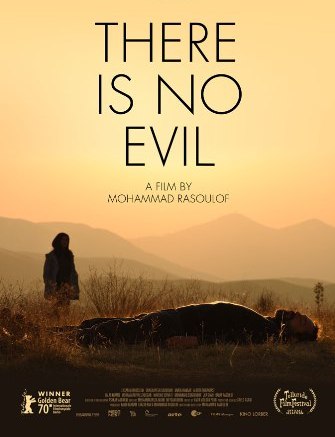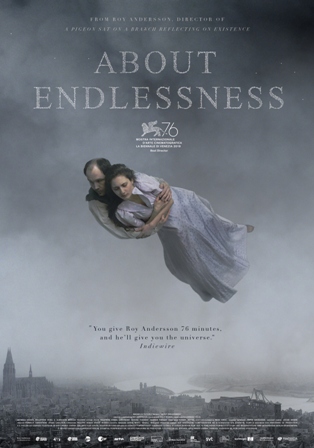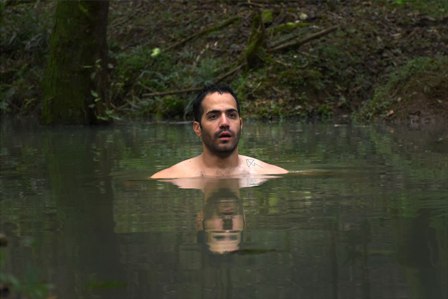Maven's Nest
Reel Life: Flick Pix


Two beautiful films observe the choices humans make in ugly, everyday circumstances, with unexpected impact on others.
By Nora Lee Mandel
THERE IS NO EVIL (SHEYTAN VOJUD NADARAD)
Directed and Written by Mohammad Rasoulof
Produced by Mohammad Rasoulof, Kaveh Farnam, and Farzad Pak
Germany/Czech Republic/Iran. 150 min. Not Rated
In Farsi with English subtitles
With: Ehsan Mirhosseini, Shaghayegh Shourian, Kaveh Ahangar, Salar Khamse, Alireza Zareparast, Mohammad Valizadegan, Mahtab Servati, Baran Rasoulof, Jila Shahi, and Mohammad Seddighimehr
Released by Kino Lorber on May 14 in theaters and virtual cinema through Kino Marquee
ABOUT ENDLESSNESS (OM DET OÄNDLIGA)
Written and Directed by Roy Andersson
Produced by Johan Carlsson and Pernilla Sandström
Sweden/Germany/Norway. 76 min. Not Rated
In Swedish with English subtitles
With: Martin Serner, Jessica Louthander, Tatiana Delaunay, Anders Hellström, Jan-Eje Ferling, Bengt Bergius, Thore Flygel, and Magnus Wallgren
Released by Magnolia Pictures on April 30
Playing now in the U.S. are two breathtaking films by masters of world cinema that powerfully deal with the banality of complicity in normalized errant society, from the post-Revolutionary Iran of Mohammad Rasoulof to the post-war Europe of Roy Andersson. Applying chapter structures, both utilize superb actors within striking mise en scènes to explore the moral complexity of everyday decisions.
Iranian writer/director Rasoulof has gone from making allegories about oppression, with Iron Island (Jazireh ahani) (2005), to direct political criticism, in Manuscripts Don't Burn (Dast-neveshtehaa nemisoosand), garnering him arrests, with bans on filmmaking and travel. Fellow filmmaker, and sometime collaborator, Jafar Panahi has made his same restrictions a plot theme, such as in This Is Not A Film (2011), Closed Curtain (Pardé) (2013), and, Taxi (2015). In There Is No Evil Rasoulof used his lower profile, short films structure, and expansive nature settings to keep this first film critical of the government’s mandatory conscription under the censor’s radar.
The titular opening episode explicitly shows the banality of evil (in Hannah Arendt’s memorable formulation), inspired by Rasoulof’s unsettling experience of recognizing his insistent interrogator doing his shopping on the same street in Tehran. Here we see a day in the life of Heshmat (Ehsan Mirhosseini). Dragging a heavy bag, he leaves work by car from a deep parking garage, through a double-gated exit, and by a high, long wall, that looks a lot like Evin Prison. At home alone, his relaxing catnap is interrupted by a neighbor asking help to rescue her children’s kitten and he complies. This Everyman suffers Tehran traffic to pick up his school teacher wife Razieh (Shaghayegh Shoorian) who quickly gets out of her required black chador into a more comfortable head scarf while gossiping about a student whose parents are no longer home. After her husband, as usual, avoids cashing his paycheck himself, they bicker about his frequent night shifts. Then their daughter complains he had promised to pick her up first from school, so he should be punished for lying.
Heshmat dutifully goes supermarket shopping (an everyday activity daringly filmed by the banned director in disguise), brings groceries to his aged mother, vacuums her apartment, and takes his daughter out for her demanded pizza. Exhausted, he seems barely to have slept before his 3 AM alarm rings. On the way to work via dark deserted streets, he has a panic attack that grinds this routine to a halt. His job will set the theme that connects to the other three chapters.
In “Chapter 2: She Said ‘You Can Do It’”, new conscript Pouya (Kaveh Ahangar) is having a similar middle-of-the-night panic attack. His nausea and phone calls from his girlfriend over avoiding a deceptively simple, yet violent, assignment are waking up the other soldiers crowded onto bunk beds in the claustrophobic facility. The angry debate among them, particularly with the big, aggressive Hasan (Alireza Zareparast ), over bad luck, obeying orders, family responsibility, class, duty, and consequences is as charged an interaction as a dramatic play, redolent of Arthur Miller’s 1964 one-acter Incident at Vichy. It is a visceral demonstration of how a authoritarian regime rewards bureaucratic acceptance of its arbitrary punishments. The tension builds, even when the plot seems to veer towards An Occurrence at Owl Creek Bridge territory.


“Chapter 3: Birthday” goes even further out of town with a different conscript, into the green nature of forest and river, flowers and rain. Javad (hunky Mohammad Valizadegan) is on another three-day leave from his barracks, and he routinely ditches his uniform as soon as he reaches the woods. He does everything he can to get to the isolated, book-filled farmhouse for the birthday of Na’na (Mahtab Servati). He arranges with her parents to ask for her hand, and brought the ring to put on it. But this gorgeous idyll, that could be from a Persian love poem, is not free from the long arm of the law, and the complicity that came with willingly, even eagerly, doing what he’s told to do. Javad’s silent, underwater screams of guilt are heartbreaking.
The final “Chapter 4: Kiss Me” is the film’s geographic and thematic lynch pin. An anxious middle-aged couple waits for a passenger disembarking at an urban airport. Twenty-year-old Darya (Baran Rasoulof) barely greets her uncle Bahram (the very expressive Mohammad Seddighimehr) and his wife Zaman (Jila Shahi) before she is already on her cell phone calling her father back in the U.S. As Zaman drives, Darya chats away about Persian poetry, her first time hearing so many people speak Farsi, and even that wearing the head scarf is cool. By the time they arrive at their home, Darya is surprised just how far off the grid they live, with no internet or phone service, in the barren desert, the kind of place a deserter would seek refuge. Here Bahram doesn’t need a driver’s license to travel the dirt roads and keep taking Darya to the highest point in order to call her father assuring she’s fine – until she’s not.
Darya suffers from youthful absolutism without context, making judgments about living and killing, truth and lies. Now middle-aged himself, Rasoulof is painfully aware that the choices made under a repressive rule, whether noble, convenient, or compromised, may not stand up to the accusatory, and even misunderstanding, gaze of the next generation.
Director Roy Andersson feels he was born into a compromised Sweden, neutral in a war against evil. (This Spring, PBS’s Atlantic Crossing and Christina Rosendahl’s The Good Traitor (Vores mand i Amerika) looked in depth at Scandinavian choices during World War II.) He compensates by minutely controlling his own cinematic world, inspired by classic paintings, which he exquisitely constructs in his own studio, using beautiful palettes of pastels, observed through a stationery camera. The slow-paced, ironic world of About Endlessness is framed by an omniscient female narrator (Jessica Louthander), who Andersson compares to Scheherazade, summing up each protagonist’s overwhelming sensation of humanity.
In separate interspersed chapters from the defeated past, Adolf Hitler (Magnus Wallgren) staggers through the bunker to his shell shocked sycophants; an endless line of German prisoners of war trudge off to Siberia in the snow (the only chapter filmed outdoors); and a Chagall-tribute couple (Tatiana Delaunay and Anders Hellström) fly mournfully over the ruins of Cologne bombed by the Allies. (His team really built a model of the city.) The Narrator can be sympathetic; “I saw two parents who had lost their son in the war”, observing them talk to him while cleaning up his grave. In contemporary contrast, another person is complicit with capitalism, The Narrator wryly intones: “I saw a woman, a communications manager, incapable of feeling shame.”
The most morally anguished is The Priest (Martin Serner) who is tormented by modern, recurring crucifixion nightmares. Though he has lost his faith, he still has to make himself perform the daily rituals his parishioners expect. He tries to use the contemporary religion of psychiatry to cope, but the therapist (Bengt Bergius) is at a loss on how to help him, and more interested in making his bus on time.
Some ache in silence about their conflicted feelings. How can The Dentist (Thore Flygel) not inflict pain on a patient who refuses anesthetic? The Narrator anticipates a young man will just stare at a young woman in front of a shop: “I saw a man who had not yet found love.”
In other chapters, people challenge social propriety with emotion. Teen-age girls are cheered for infectiously dancing to a Delta Rhythm Boys song as they pass by an outdoor café. But evening commuters are disgusted by a fellow suit who weeps uncontrollably. A female passenger confronts them: “What? You’re not allowed to be sad anymore?” Shoppers in a market scene do step in to hold back a man jealously enraged at his wife, letting go when the couple expressess their love for each other, then tackling him down when he resumes his attack.
Watch patiently to pick out the existential lessons you draw from each vignette in About Endlessness. Andersson sees hope through the next generation – a son patiently holding up his new baby so his mother can busily take endless snapshots, and a father in endless pouring rain putting down his umbrella to tie his daughter’s shoes. But I was haunted by the Iranians in There Is No Evil who can find joy in such quotidian actions while having to participate in an unjust system.
May 25, 2021
Nora Lee Mandel is a member of New York Film Critics Online. Her reviews are counted in the Rotten Tomatoes TomatoMeter:
 Complete Index to Nora Lee Mandel's Movie Reviews
Complete Index to Nora Lee Mandel's Movie Reviews
My reviews have appeared on: Film-Forward; FF2 Media; Lilith, FilmFestivalTraveler; and, Alliance of Women Film Journalists and for Jewish film festivals. Shorter versions of my older reviews are at IMDb's comments, where non-English-language films are listed by their native titles.
Recommended Films at Mandel Maven's Nest Reel Life: Flick Pix
Copyright © 2021





